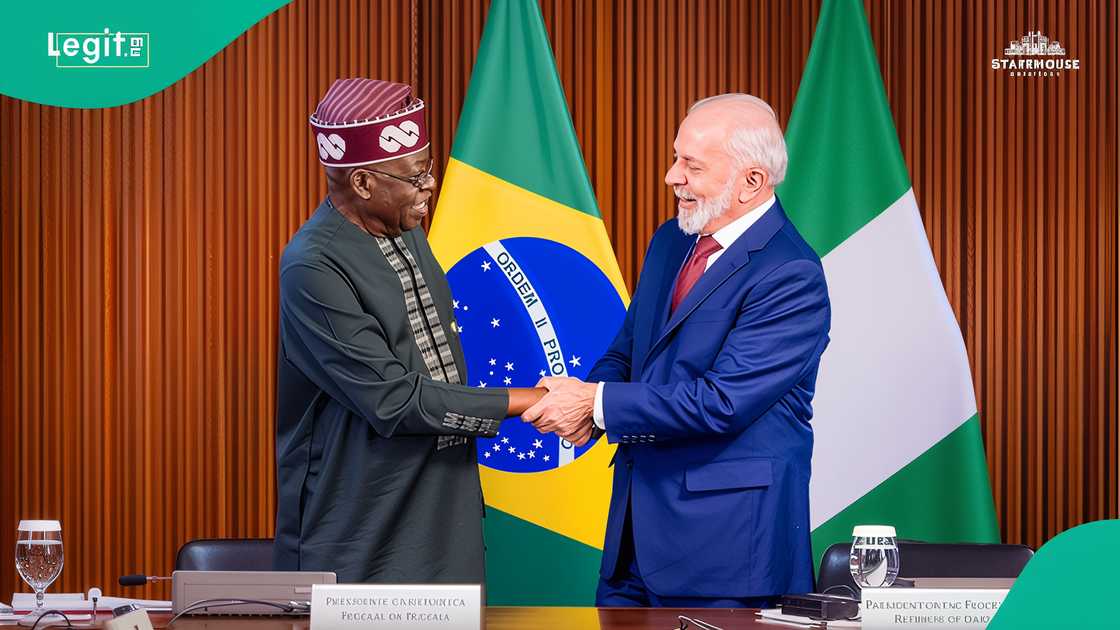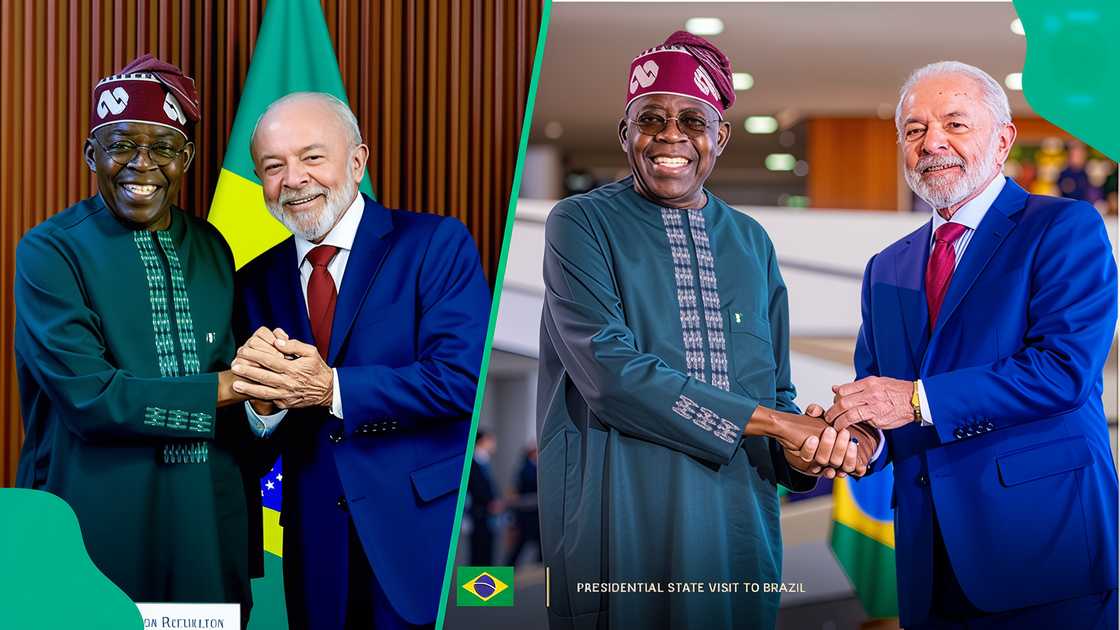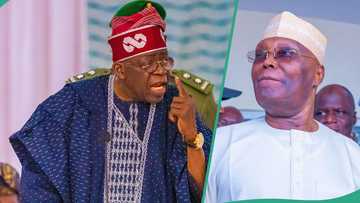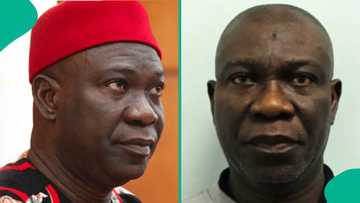South-South Diplomacy: What Tinubu’s Brazil Visit Means for Nigeria’s Immediate Economic Needs
When Nigerian President Bola Tinubu’s flight landed in Brazil on Monday, August 25, 2025, for a two-day state visit, it was more than a regular charade of hugs and handshakes between leaders of two states; it was an affirmation of an established truth — a relationship running deeper than diplomacy. Both nations formally established diplomatic relations in 1961, shortly after Nigeria’s independence in 1960. But beyond this formalisation of the bilateral pact lies a chain of socio-cultural ties openly rooted in the transatlantic slave trade. In the world today, Brazil proudly boasts itself as the home to the largest Black population outside Africa, many of whom claim and trace their roots to the Yoruba, Hausa, and other Nigerian ethnic groups.

Source: Twitter
In both countries, cuisine and culture are shared ancestries. On the streets of São Paulo and Rio de Janeiro, millions of Brazilians believe Nigeria is their second home.
Yoruba royal patriarch and Ooni of Ife, Oba Enitan Ogunwusi Ojaja II, in one of his recent visits to Brazil, declared Quilombola, an Afro-Brazilian settlement, as a Yoruba territory and Bahia as the headquarters of the Yoruba nation in the Americas. This clearly establishes the long history of mutual friendship reflected in the rhythms of samba to credal affiliation.
Hence, if President Tinubu’s visit was something to describe, it was indeed a clearer push to transform cultural kinship into tangible economic gains in a bid to address Nigeria’s pressing needs for investment, jobs, and trade diversification in the face of a global shift towards protectionism.
For the first time since Tinubu took over power in 2023, the Nigerian leader and his Brazilian counterpart, Luiz Inácio Lula da Silva, met in Ethiopia at the African Union summit in February 2024, where they discussed cultural relations, trade enhancement, and commercial activities.
Later in July 2025, at the BRICS Summit, they met in Rio de Janeiro, where they extended their discussion on trade expansion, energy transition, agriculture, and direct flight. But it was during the August 25 “very emotional” visit that Brazil and Nigeria were able to officially propel new pacts into the future of their economic association and trade realignment.

Read also
Did Kebbi schoolgirls' abduction happen in a Christian enclave as US lawmaker Moore claimed? Fact emerges
For a country fighting inflation and an unstable economy, this is a big win, specifically for Nigeria. President Tinubu, with his ministers, was able to sign deals and multi-sectoral Memoranda of Understanding (MoUs) aimed at strengthening trade, diplomacy, science, aviation, and finance cooperation. These deals will respond directly to Nigeria’s immediate economic pressure and demand.
For instance, the Bilateral Aviation Safety Agreement (BASA), which was signed by the Minister of Aviation and Aerospace Development, Festus Keyamo, and Brazil’s Minister of Ports and Airports, Silvio Costa Filhos, will not only boost trade and people-to-people relationships but also lower logistics costs, increase direct investment, and allow Nigeria to widen its competitive export power.
In terms of economic impacts, Nigeria can export agricultural produce, oil-related products, textiles, and cultural goods directly to Brazil, instead of routing via Europe or the Middle East, leading to a projected $3.5 billion trade value by 2030.
In the aviation industry, the presence of Embraer, a Brazilian aircraft manufacturer, will tighten the Nigerian aviation security and safety, while Airpeace, Nigeria’s private airline’s direct flight to Sao Paulo will deepen economic and cultural ties between both nations.

Source: Twitter
Brazil is arguably Latin America’s largest economy and a global agricultural powerhouse, while Nigeria is one of Africa’s largest economies with vast arable land and a young, dynamic population.
The MOU for cooperation on trade and investment promotion, signed by the Managing Director of Nigeria’s Bank of Agriculture, Ayo Sotinrin, and Brazil’s Minister for the National Bank for Economic and Social Development (BNDES), Aluísio Mercadante, will greatly expand agricultural financing, investment, and joint projects, while also helping Nigeria utilise its youthful human population and capacity.
Also, the $1.1 billion Green Imperative Partnership (GIP), a Brazil-supported government-to-government initiative, could transform Nigerian agriculture and create jobs when the Latin American state starts the delivery of 10,000 tractors and 50,000 pieces of agricultural equipment, said to be assembled and maintained in Nigeria.
Of course, the possible return of Petrobras will be another game-changer in Nigeria’s energy revolution. The Brazil-owned oil company, which began operations in Nigeria in 1998 in the deep waters off the Niger Delta, left five years ago and sold off its stakes to raise cash for domestic projects.
Experts attributed it to pipeline vandalism and oil theft, security challenges in the Niger Delta, and regulatory uncertainty, among other factors. With President Tinubu assuring that its return will “be done as soon as possible”, the move will reignite economic cooperation in the energy sector and ensure further revival of exploration in deepwater oil and gas.

Read also
Nigeria vs Congo: Peter Obi sends emotional message to Super Eagles as netizens react, “sad”
The Nigerian National Petroleum Company (NNPC) Limited just revealed that Petrobras is willing to explore new areas in Nigeria’s upstream sector. This emphasised the earlier position echoed by the Nigerian vice-president, Kashim Shettima, during Geraldo Alckmin, Brazil’s vice-president’s visit to Nigeria in June 2025.
Petrobras’ return will not only lead to massive job creation in the upstream oil sector but also help Nigeria penetrate its gas repositories, leading to the availability of energy for trade and domestic consumption.
President Tinubu’s visit grossly underscores the promise of South-South diplomacy; it is one that goes beyond symbolic gestures and speaks directly to Nigeria’s urgent economic realities.
By reviving moribund partnerships in energy, aviation, agriculture, technology, and innovation through multisectoral MoUs, Africa’s most populous nation seeks not just trade deals but pathways to growth and stability at a time of fiscal strain.
Brazil currently has the largest economy in South America in terms of nominal GDP, totalling approximately $2.33 trillion. On the other hand, Nigeria’s GDP, having grown by 3.13% in the first quarter of 2025, is estimated $243.7 billion according to the National Bureau of Statistics, showing a promising shift.
The Global South agreements must therefore move beyond rhetoric to avoid the visit becoming another photo-op in Nigeria’s long history of misused opportunities under Tinubu’s Renewed Hope watch.
Rahaman Abiola is the Editor-in-Chief of LEGIT.ng and a 2025 fellow of Ominira Economic Advancement Initiative.
Disclaimer: The views and opinions expressed here are those of the author and do not necessarily reflect the official policy or position of Legit.ng.
Source: Legit.ng





